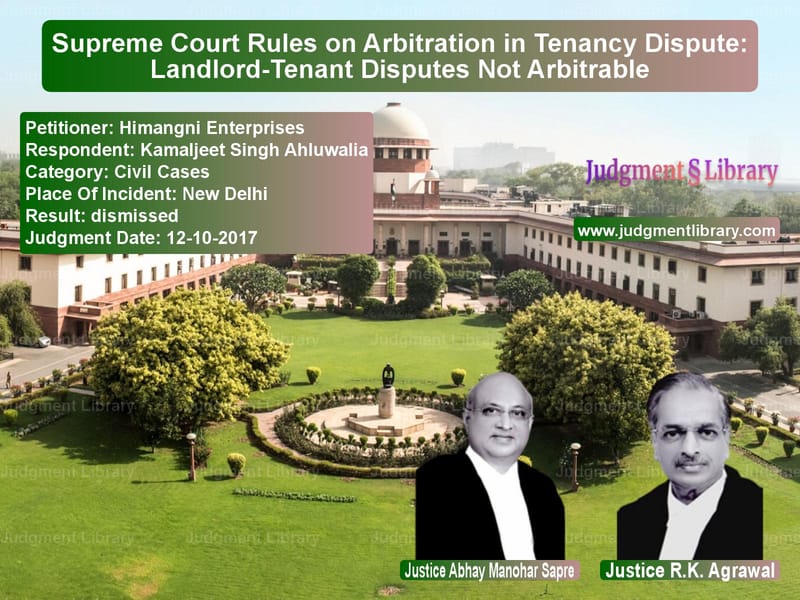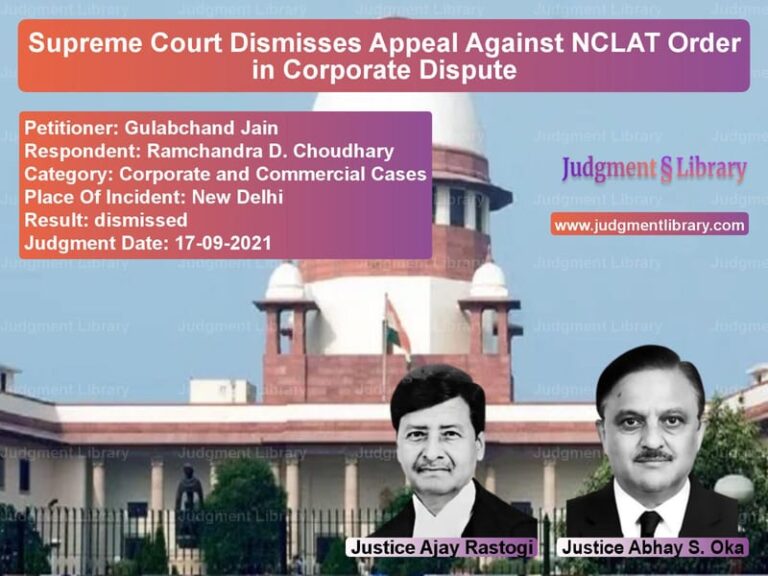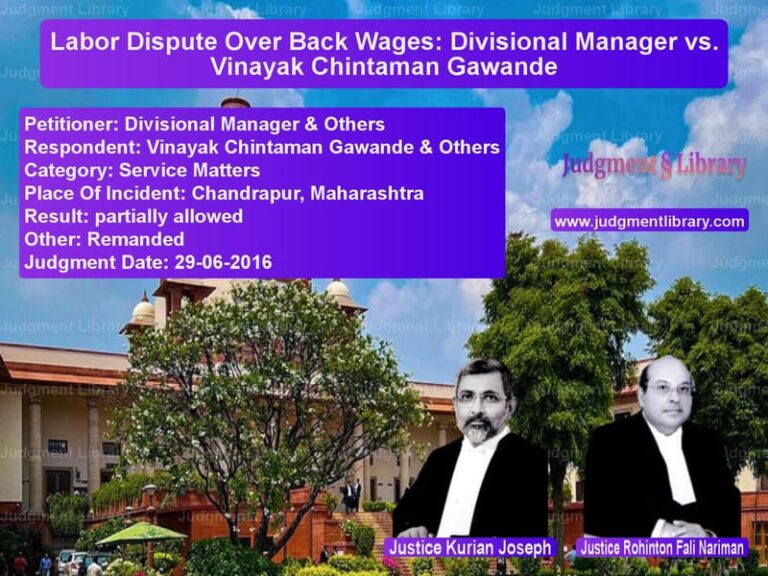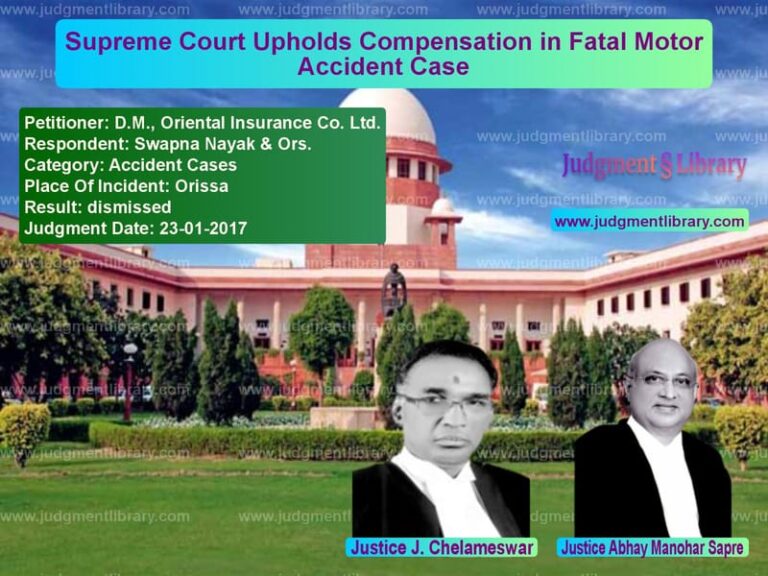Supreme Court Rules on Arbitration in Tenancy Dispute: Landlord-Tenant Disputes Not Arbitrable
The Supreme Court of India delivered a significant verdict in the case of Himangni Enterprises vs. Kamaljeet Singh Ahluwalia, addressing the applicability of arbitration clauses in landlord-tenant disputes. The Court ruled that such disputes are not arbitrable and must be resolved through civil courts.
Background of the Case
The case originated from a tenancy dispute over a commercial property located in New Delhi. The respondent (landlord) had leased out Shop No. SF-2 in the commercial complex “Omaxe Square” to the appellant (tenant), Himangni Enterprises, under a lease deed executed on August 31, 2010. The lease was initially for three years and expired in 2013. However, the tenant continued to occupy the premises without a renewed lease agreement.
In 2015, the landlord filed a suit before the Additional District Judge, Saket Courts, New Delhi, seeking eviction, recovery of rent arrears, and a permanent injunction against the tenant. The tenant, in response, filed an application under Section 8 of the Arbitration and Conciliation Act, 1996, arguing that the lease agreement contained an arbitration clause (Clause 9.8), which mandated arbitration as the mode of dispute resolution.
Arguments of the Appellant (Tenant)
The tenant argued:
- The lease deed contained a binding arbitration clause, making arbitration the sole mechanism for resolving disputes.
- The landlord, by filing a civil suit, was in violation of the arbitration agreement.
- Under Section 8 of the Arbitration and Conciliation Act, 1996, the court was bound to refer the matter to arbitration.
- Since the dispute was commercial in nature, it was arbitrable and did not fall under any statutory exemption.
The tenant contended, “The parties agreed to resolve disputes through arbitration. The courts should uphold party autonomy and refer the dispute to arbitration.”
Arguments of the Respondent (Landlord)
The landlord countered:
- The arbitration clause became inoperative upon the expiry of the lease period.
- Tenancy disputes, particularly those involving eviction and recovery of rent, fall under the jurisdiction of civil courts.
- Under the Transfer of Property Act, eviction matters are to be adjudicated by civil courts, not arbitrators.
- The respondent had the legal right to initiate eviction proceedings as per civil law.
The landlord argued, “The jurisdiction of civil courts in eviction matters is well established, and arbitration cannot override statutory protections granted to tenants and landlords.”
Supreme Court’s Key Findings
The Supreme Court upheld the decisions of the trial court and the Delhi High Court, ruling that landlord-tenant disputes are not arbitrable. The key observations included:
“The disputes relating to landlord-tenant matters, governed by special statutes or the Transfer of Property Act, must be adjudicated by civil courts. Arbitration is not the appropriate forum for deciding tenancy rights.”
The Court further noted:
- Eviction and rent disputes require judicial scrutiny and statutory adjudication.
- Allowing arbitration in tenancy matters would bypass statutory safeguards provided to tenants.
- The Natraj Studios (P) Ltd. vs. Navrang Studios case had previously established that landlord-tenant disputes were not arbitrable.
- The Booz Allen & Hamilton Inc. vs. SBI Home Finance Ltd. ruling reaffirmed that disputes involving property rights are not subject to arbitration.
Final Judgment
The Supreme Court ruled:
- The arbitration clause in the lease deed was inapplicable for deciding eviction and rent disputes.
- The civil suit filed by the landlord was valid and must proceed in the civil court.
- The application under Section 8 of the Arbitration and Conciliation Act, 1996, was rightly dismissed by the lower courts.
- The case must now be tried and decided on merits by the civil court.
Key Takeaways from the Judgment
This ruling establishes important principles regarding arbitration in property disputes:
- Jurisdiction of Civil Courts: Landlord-tenant disputes must be adjudicated by civil courts, not arbitrators.
- Limitations of Arbitration: Arbitration agreements cannot override statutory provisions governing tenancy rights.
- Binding Precedents: The Supreme Court reaffirmed previous rulings that restrict arbitration in landlord-tenant disputes.
- Legal Clarity: This judgment provides clear guidance on the applicability of arbitration clauses in tenancy matters.
Impact of the Judgment
The ruling has far-reaching implications for property law and arbitration:
- It reinforces the supremacy of civil courts in eviction and rent matters.
- It prevents landlords from using arbitration to bypass legal protections available to tenants.
- It strengthens tenants’ rights by ensuring that eviction cases are heard in appropriate forums.
- It establishes a clear distinction between arbitrable and non-arbitrable disputes in property law.
Conclusion
The Supreme Court’s decision in Himangni Enterprises vs. Kamaljeet Singh Ahluwalia clarifies the legal position on arbitration in landlord-tenant disputes. By ruling that such disputes must be resolved by civil courts, the Court has upheld statutory protections and ensured that property law principles remain intact. This case serves as a vital precedent for similar disputes in the future.
Don’t miss out on the full details! Download the complete judgment in PDF format below and gain valuable insights instantly!
Download Judgment: Himangni Enterprises vs Kamaljeet Singh Ahlu Supreme Court of India Judgment Dated 12-10-2017.pdf
Direct Downlaod Judgment: Direct downlaod this Judgment
See all petitions in Property Disputes
See all petitions in Landlord-Tenant Disputes
See all petitions in Specific Performance
See all petitions in Judgment by Abhay Manohar Sapre
See all petitions in Judgment by R K Agrawal
See all petitions in dismissed
See all petitions in supreme court of India judgments October 2017
See all petitions in 2017 judgments
See all posts in Civil Cases Category
See all allowed petitions in Civil Cases Category
See all Dismissed petitions in Civil Cases Category
See all partially allowed petitions in Civil Cases Category







